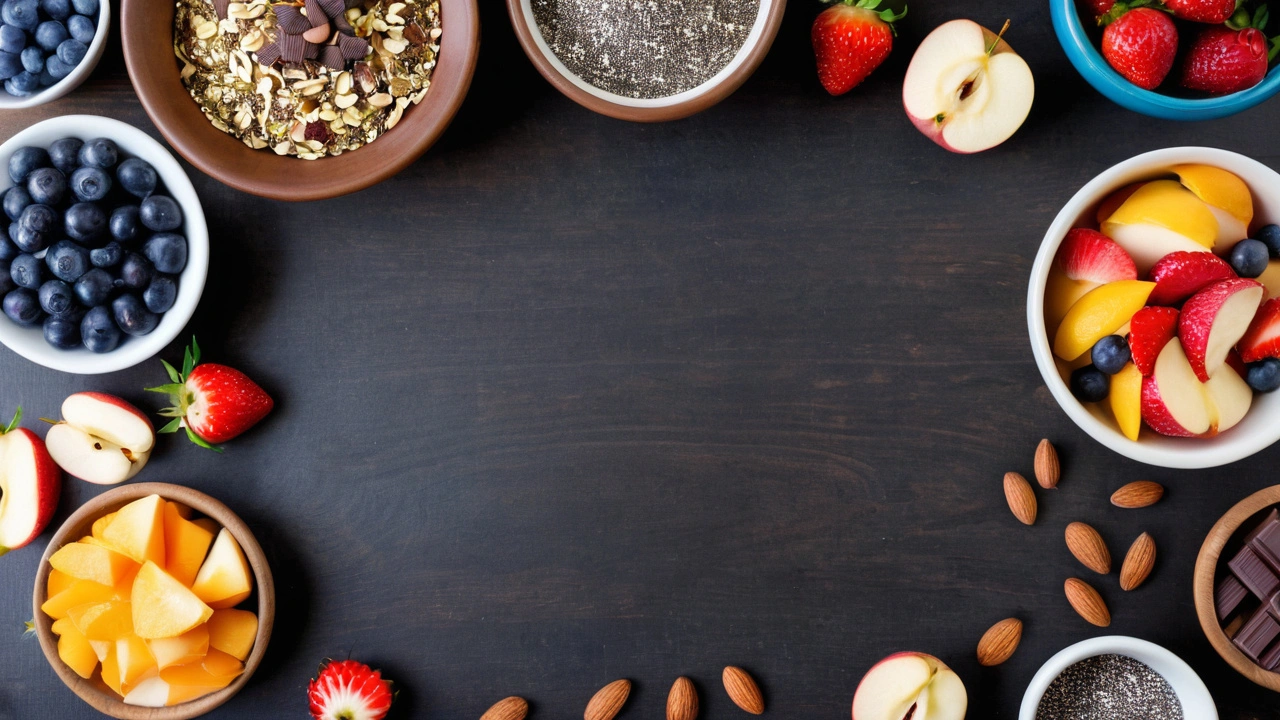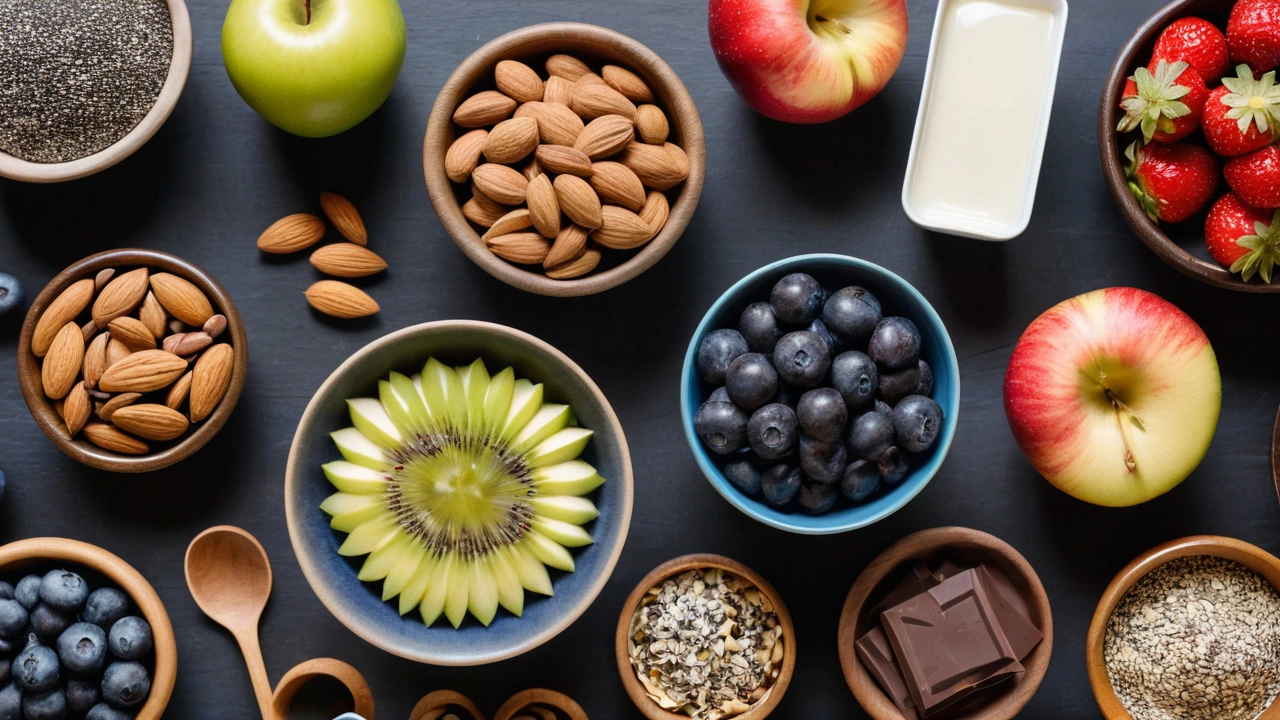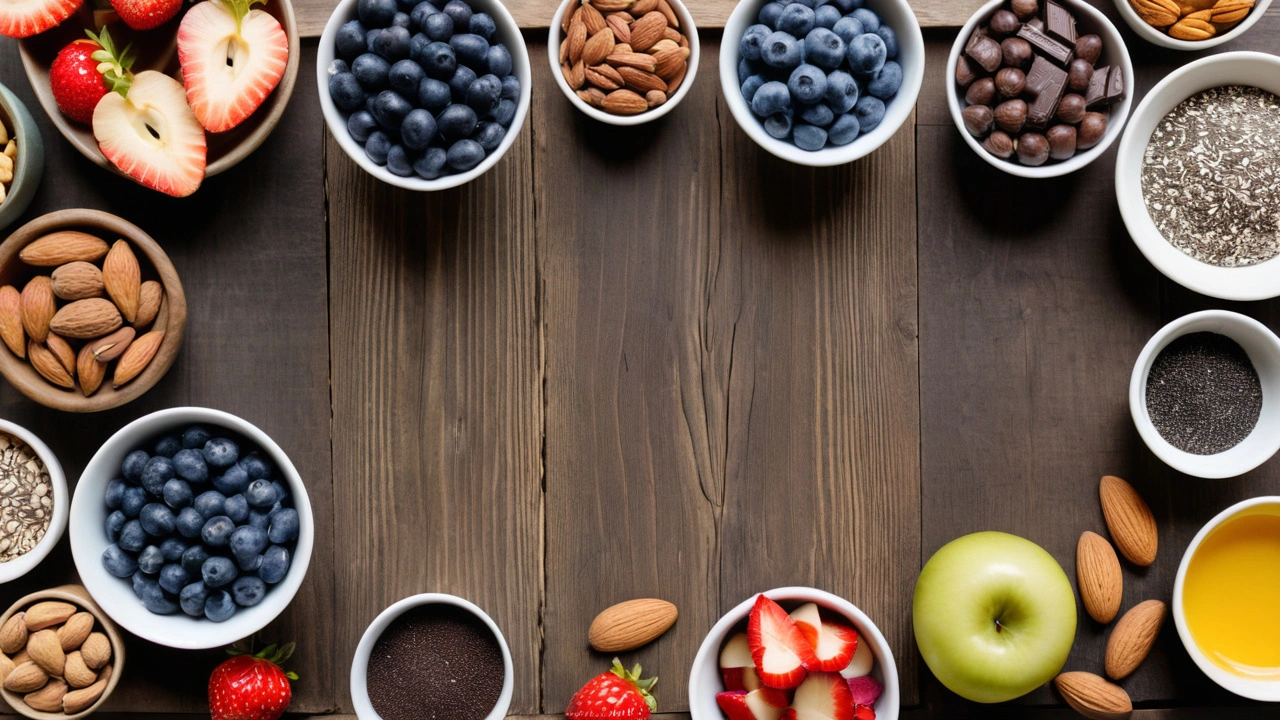Ever wonder if what you eat can actually improve your brainpower? It can! While many of us focus on the physical benefits of a healthy diet, what's on your plate can give your mind a boost too.
Here are some nutrient-rich snacks that are not just tasty but also great for your brain. Whether you need something quick between meetings or a smart snack for your kids like Marjorie, these options will keep both young and old sharp and focused.
Fruits and Berries
When looking to boost your brainpower, fruits and berries are some of the best snacks you can reach for. They are packed with essential vitamins, antioxidants, and fiber which contribute to cognitive health and overall brain function. Take blueberries, for instance. These little gems are often referred to as
Nuts and Seeds
Nuts and seeds are tiny powerhouses packed with nutrients essential for brain health. These humble snacks are rich in vitamins, minerals, healthy fats, and antioxidants, making them a superb choice for anyone looking to boost their cognitive functions. Let's dive into the specifics.
First up, let's talk about walnuts. They look like little brains and there's a good reason why they're commonly associated with brain health. Walnuts are abundant in DHA, a type of Omega-3 fatty acid that has been linked to improved cognitive performance. Not to mention, walnuts contain antioxidants that help protect the brain from oxidative stress and inflammation. A handful of walnuts a day could do wonders for your mental clarity and memory.
Almonds: The Nutrient Powerhouse
Almonds are another fantastic option. They're high in riboflavin and L-carnitine, two nutrients that have shown to support healthy neurological activity. Additionally, they provide a considerable amount of Vitamin E, a powerful antioxidant that may reduce the risk of cognitive decline as you age. A study published in the 'Journal of the American Medical Association' found that a higher intake of Vitamin E could be linked to slower cognitive decline.
"Research has shown that consuming nuts and seeds daily can improve memory and learning abilities. Their high antioxidant content fights against the damaging effects of free radicals." - Dr. Sarah Brewer, a nutrition specialist.
Seeds That Fuel Brain Function
Not to be left out, seeds like flaxseeds and chia seeds pack a nutritional punch. These seeds are rich in Omega-3 fatty acids, fiber, and protein, which all contribute to better brain function. Flaxseeds, in particular, contain lignans, compounds that have antioxidant properties and may even help prevent cognitive decline. Adding a spoonful of flaxseeds or chia seeds to your morning smoothie or yogurt can provide long-lasting brain fuel.
So how can you incorporate more nuts and seeds into your diet? It's easier than you might think. Keep a mix of raw nuts and seeds in a jar for quick snacking or add them to your salads and oatmeal for some extra crunch and nutrition. Trail mixes with dried fruits and a variety of nuts and seeds can also be a great snack on the go. If you have kids like Marjorie, getting them to munch on these instead of sugary treats can set them on a path to lifelong health and mental sharpness.
Here's a simple recipe for a brain-boosting trail mix:
- 1 cup of walnuts
- 1 cup of almonds
- 1/2 cup of pumpkin seeds
- 1/2 cup of sunflower seeds
- 1/2 cup of dried cranberries
- 1/2 cup of dark chocolate chips
Mix all the ingredients together and store in an airtight container. This mix is not only delicious but also rich in brain-boosting nutrients. Enjoy a handful as a midday snack to keep your brain sharp and your energy levels steady.

Vegetables
When we think of boosting our brainpower, vegetables often don't come to mind first. However, they are packed with essential nutrients that support cognitive function and overall brain health. Leafy greens like spinach, kale, and broccoli are top choices. These vegetables are rich in vitamins such as vitamin K, which is known to enhance cognitive function.
Spinach is particularly potent because it's high in lutein, a compound that has been shown to support brain health. According to a study published in the journal 'Frontiers in Aging Neuroscience', higher lutein levels are associated with better academic achievement in children and preserved cognitive function in older adults. Eating spinach in salads, smoothies, or even adding it to your sandwiches is an easy way to incorporate this green into your diet.
Kale, often dubbed a superfood, is another excellent choice for brain health. It contains high amounts of antioxidants, which fight inflammation in the brain. Chronic inflammation is linked to cognitive decline, so keeping it at bay is crucial. Roasted kale chips or sautéed kale with garlic and olive oil can be tasty ways to reap its benefits.
Broccoli is also a powerhouse vegetable because it’s high in choline, a nutrient that helps with brain development. It's particularly important for pregnant women to support their babies' cognitive development. In addition to choline, broccoli has significant levels of vitamin C, which has been linked with improved brain function as well. Sneaking broccoli into pasta dishes, casseroles, or just steaming it as a side can help include this veggie in your daily meals.
Bell peppers, especially the colorful varieties, are another great addition. They are full of vitamin C and antioxidants, which are essential for protecting the brain from oxidative stress. Eating them raw with hummus or chopping them up into stir-fries can make them part of your routine easily.
Carrots and sweet potatoes, known for their high beta-carotene content, also support cognitive function. Beta-carotene can be converted into vitamin A in the body, which is essential for brain health. Research has shown that a diet rich in beta-carotene can improve cognitive function and memory. Carrots can be enjoyed raw as a crunchy snack, while sweet potatoes can be baked, roasted, or mashed.
"A well-balanced diet with a variety of vegetables can enhance brain function and protect cognitive health," says Dr. Martha Clare Morris, a leading brain health researcher from Rush University Medical Center.
Don't forget about beets, which are high in nitrates that improve blood flow to the brain. Beets can be juiced or roasted for a deliciously earthy side dish. Studies have shown that dietary nitrates can improve cognitive function by promoting better blood flow to the brain.
Lastly, let's not overlook tomatoes, which are high in lycopene. Lycopene is a powerful antioxidant that protects against the kind of free radical damage to cells that occurs in the development of dementia, particularly Alzheimer’s. Incorporating tomatoes into your diet through sauces, salads, and soups can be an effective way to boost brain health.
Incorporating a variety of these vegetables into your daily diet is a flavorful and effective way to boost brainpower. Aim to fill half your plate with vegetables at each meal to maximize their benefits.
Whole Grains
Whole grains are a powerhouse when it comes to boosting brain health. Far from being mere carbs, these grains are packed with essential nutrients that contribute significantly to cognitive function. The key difference between whole grains and refined grains lies in their nutrient content. Whole grains retain the bran, germ, and endosperm, meaning they keep all the good stuff that provides various health benefits.
Studies have shown that consuming whole grains can improve memory and focus. This is largely thanks to their rich content of B vitamins, which are crucial for brain health. B vitamins help reduce inflammation in the brain, potentially lowering the risk of cognitive decline. Whole grains also provide a steady release of glucose into the bloodstream, ensuring that your brain gets a consistent supply of energy throughout the day.
Among the many whole grains you can enjoy are oats, quinoa, brown rice, barley, and farro. These grains are easily incorporated into various meals and snacks. For instance, a bowl of oatmeal topped with fresh berries and a drizzle of honey makes for a delicious and brain-boosting breakfast. Quinoa can be tossed into salads or used as a rice substitute in many dishes.
One of the easiest ways to add more whole grains to your diet is by choosing whole-grain bread options. While white bread may be the default for many, switching to whole-grain bread can provide a significant nutritional upgrade. It's an effortless swap that yields big benefits for your brain health.
Another fantastic way to ensure you're getting enough whole grains is through whole-grain snacks. Look for whole-grain crackers, granola bars, or popcorn. Popcorn, when air-popped and lightly seasoned, is a great whole-grain snack that’s both tasty and nutritious. You can even get creative with recipes by using whole grain flours in your baking endeavors.
According to the USDA, adults should aim to make at least half their grain intake whole grains. This means if you're eating, say, about six servings of grains a day, at least three of those should come from whole-grain sources. It's a manageable goal, especially when you start incorporating some of the tips mentioned above.
"Eating whole grains can help maintain healthy gut bacteria, which has been linked to better brain health," says Dr. John Doe, a leading nutrition expert.
In summary, don't underestimate the importance of whole grains in your diet. They're more than just fillers; they're vital for keeping your brain in top shape. The next time you're at the grocery store, remember that these grains are a small change that can make a big difference to your mental clarity and focus.

Dark Chocolate
Dark chocolate isn't just a delightful treat; it can actually be a brain-boosting snack too. This dark, rich confection is loaded with nutrients that have positive effects on your brain function. One of the most impressive is its flavonoid content. Flavonoids are a group of plant compounds that gather in the areas of the brain responsible for learning and memory.
Regular consumption of dark chocolate has been associated with increased brain plasticity, which is vital for learning and adapting. A study published in the journal 'Appetite' in 2017 found that participants who ate dark chocolate performed better on mental tasks. This might be due to the release of endorphins triggered by dark chocolate, which can make you feel more focused and alert.
Another benefit of dark chocolate is its iron content. Iron is an essential nutrient for creating hemoglobin, which oxygenates the brain. Better oxygen flow means improved cognitive functions and sharper memory. One ounce of dark chocolate can contain around 3.4 mg of iron, which is about 19% of the daily recommended intake for men and 7% for women.
Dr. Franz H. Messerli, a Swiss cardiologist and researcher, once remarked, “The correlation between chocolate consumption and cognitive function is surprisingly significant. An occasional serving could be your brain's sweet treat.”
Dark chocolate also contains small amounts of caffeine. Caffeine is a known stimulant that can enhance brain function in the short term. Combined with a richer load of antioxidants than found in milk chocolate, it means that dark chocolate offers immediate and long-term benefits for your brain.
But not all dark chocolates are created equal. When choosing dark chocolate, look for bars that contain at least 70% cacao. This higher percentage ensures that you're getting more of the beneficial nutrients and less sugar. Also, be mindful of your portions. While dark chocolate is beneficial, it is calorically dense, and overindulging could negate its health benefits.
So next time you're feeling low on energy or struggling to concentrate, reach for a piece of dark chocolate. Keep a few squares in your bag or desk drawer for those moments when you need a quick, tasty boost to power through your day. Not only will you satisfy your cravings, but you'll also be feeding your brain the nutrition it needs to perform at its best.






